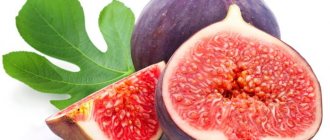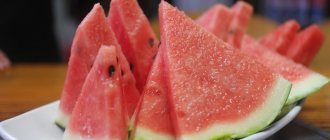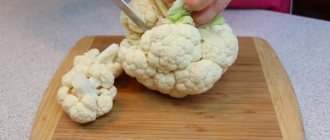Views - 15,895
Breast milk is the best food for a baby - this statement does not raise any doubts. From mother's milk, the baby receives all the substances it needs for active and full growth, as well as, no less important, the development and strengthening of the immune system. It has been established that the composition of a baby’s first food largely depends on what the “producer” eats. That is why women who are breastfeeding need to be as careful as possible when choosing the foods they eat.
When compiling a diet, attention is paid even to such a seemingly familiar, ordinary and harmless fruit, the appearance of which millions of people look forward to every summer, like the apricot.
After reading the information below, you will find out whether apricots can be eaten by nursing mothers, how they affect the composition of milk and the condition of the baby, when and how it is recommended to introduce this fruit into your diet, and also in what form it is best to consume it.
- Apricots and their relatives: what about canned and dried fruits?
- Planning your diet wisely: precautions
Video - Can you eat apricots while breastfeeding?
What are the benefits of apricots?
Apricots are a summer fruit that is actively used for making compote, jam, preserves, jam fillings and pies, or eaten fresh. Fragrant fruits contain a large amount of vitamins and microelements, including:
- vitamins A, C, E, K, PP and group B (except B4 and B12);
- trace elements potassium, calcium, silicon, magnesium, phosphorus, iron, iodine, cobalt, manganese, copper, zinc and chromium;
- alimentary fiber.
Share of BZHU in calorie content:
- proteins - 9%;
- fats - 2%;
- carbohydrates - 89%.
The calorie content of apricots is 44 kcal per 100 g of product.
The rich chemical composition of the fruit has the following positive properties on the body of a nursing woman:
- Normalizes digestion processes and prevents constipation - the product contains a lot of fiber, which has a slight laxative effect on the body and also promotes the transport of digestive products through the intestines. It activates the production of gastric juice, which has a positive effect on the absorption of nutrients. The improvement in peristalsis will be appreciated by young mothers who are faced with the problem of atonic constipation in the postpartum period.
- Combats potassium deficiency - this substance takes part in regulating cellular water balance, the level of which determines blood pressure. Potassium deficiency in the body causes the development of cardiovascular diseases and hypertension, and also increases the likelihood of stroke.
- Strengthens bone tissue - a complex of microelements, especially calcium, contained in apricot pulp, makes bones stronger and promotes their development. During pregnancy, the female body intensively releases calcium to build the child’s body; for this reason, introducing apricots into the diet is advisable.
- Improves vision - carotene, beta-carotene and other substances contained in apricots improve the quality of vision, strengthen the optic nerve of the eyeballs and retina, and reduce the rate of weakening of peripheral vision. Apricots help relieve symptoms of dry eye syndrome.
- Supports the heart muscle and cleanses blood vessels - the combination of dietary fiber, ascorbic acid and potassium has a beneficial effect on the functioning of the cardiovascular system. Regular consumption of the fruit helps protect the heart from the effects of free radicals, normalizes blood pressure, and helps eliminate “bad” cholesterol.
- It is an excellent prevention of anemia - the large amount of iron and copper contained in the product helps to increase the level of hemoglobin in the blood. A lack of red blood cells leads to disruption of systems and internal organs. Signs of anemia are dizziness, general weakness, disruptions in the digestive system, etc.
- Eliminates excess weight - electrolytes (potassium and sodium) help normalize the body's water balance, promote proper energy distribution and accelerate metabolic processes. This leads to the removal of excess fluid from tissues, stimulation of digestion and acceleration of fat breakdown. Apricot has a low calorie content, so it can be consumed by nursing mothers who want to get in shape as quickly as possible.
- Improves skin condition - retinol (vitamin A) protects skin cells from free radicals and stimulates collagen production. This slows down the aging process of the skin, it becomes elastic and fresh.
- Effective in the treatment of certain diseases - apricot juice from fresh fruits is a storehouse of vitamins. It helps a weakened body recover faster, removes toxins and is an excellent prevention of vitamin deficiency. Apricots have anti-inflammatory and soothing properties and are effective against fevers.
Photos of apricots
Beneficial properties of dried apricots for the human body
Dried apricot has many advantages over ripe fruit. This is distinguished by the concentrated content of useful substances, the ability to use the product all year round, while the use of fresh fruits is limited to the season. When drying an apricot, 85-90% of its beneficial properties are retained. By removing water, the fruits become more caloric (232 kcal), and the content of vitamins and macro- and microelements per 100 g of product increases by 3-4 times.
Application of dried apricots
The daily intake of dried apricot for an adult is 100-150 g. This fully satisfies the daily requirement of potassium, iron and beta-carotene.
Dried fruits are used for treatment and prevention:
- gastrointestinal disorders;
- diseases of the heart and blood vessels;
- cleansing the kidneys of toxins;
- anemia, anemia;
- hypovitaminosis;
- disorders in the endocrine system;
- hypertension;
- slagging of the body;
- eye diseases.
Regular consumption of dried apricots reduces the risks of heart attack and stroke, the formation of chronic syndromes of renal and heart failure.
https://youtube.com/watch?v=yo4Gr9hdpjY
The best recipes with dried apricots
You can use dried apricots, kaisa or apricots in medicinal recipes. It is recommended to soak brightly colored dried fruits in water for 15 minutes before using.
The use of dried fruits for diseases and disorders of the body:
- Vessels. Dried apricots (5 pcs.), hawthorn and rosehip fruits (1 tablespoon each) are poured with boiling water (0.5 l) and left in a thermos for 10 hours. The strained infusion is taken 100 ml 3 times a day before meals. The course of treatment is 14 days. The folk remedy suppresses the processes of thrombus formation, the adhesion of cholesterol to the walls of blood vessels.
- Heart. To prepare the medicinal mixture you will need dried apricots (200 g), raisins (20 g), walnuts (50 g), honey (25 g), lemon juice (1 pc.). Finely ground ingredients are mixed with honey and lemon juice and mixed in a glass container. The mixture is kept for 3 hours. Take 2 tbsp. l. spoons 1 time a day before breakfast. To improve heart rhythm and strengthen the myocardium, you will need to take the drug continuously for a month.
- Constipation. Dried apricots (200 g), raisins (200 g), walnuts (100 g), hay grass (50 g), honey (0.5 l), flaxseed (100 g) are passed through a meat grinder. The mixture is transferred to a glass container and stored in the refrigerator. Recommended daily use of 1 tbsp. l. before breakfast for 5 days.
- Anemia, hypovitaminosis, strengthening the immune system. Dried apricots, prunes, raisins, figs, rose hips (100 g each) are poured with filtered water until completely immersed, soaked for 8 hours. After this, the mixture is passed through a meat grinder. Take 1 tbsp. l. 4 times a day for 1 month. The paste is stored in a glass container in the refrigerator.
- Eyes. Dried apricots (3-4 pieces) are poured with boiling water (0.5 l), left for 3 hours. Take 100 ml 3 times a day. The infusion will help strengthen the blood vessels of the eyes. The same recipe will be useful for disorders of the endocrine system.
- Cleansing the kidneys and body. Dried apricots (10 pieces) are poured with boiling water (1 l) and left for 10 hours. 100 ml of infusion is consumed before breakfast, the rest of the volume is distributed throughout the day, gradually eating the fruits. The cleansing course lasts 3 weeks; during this period, animal products are excluded.
Decoction of dried apricots
To prevent urolithiasis and strengthen the body, compote will be useful. It's very easy to cook. To do this, peeled and washed dried apricots (300 g) are poured with water (2.5 l) and cooked for no more than 6-7 minutes over low heat. To make the drink more healthy, sugar is replaced with natural honey. Compote will be useful for the daily diet of people of different ages.
Is it possible to eat apricots while breastfeeding?
Many young mothers are concerned about the question of whether it is possible to eat apricots during breastfeeding and how this will affect the child. It should be noted that it is useful to eat apricots during pregnancy. But there are some peculiarities when breastfeeding, which we will discuss later.
In the first month
Is it possible to eat apricot while breastfeeding a newborn? Pediatricians do not recommend doing this, since at this time the baby’s body is not yet prepared for such food. As a result, if a breastfeeding woman consumes apricot, the baby may experience allergic reactions or stool upset.
At 2, 3, 4 months
What to do if you want apricots, but the child is only 2, 3 or 4 months old? You can try eating half a fruit and watch your child. At the first signs of an allergy or the appearance of diarrhea, you should immediately consult a pediatrician. And also postpone eating apricots to a later date.
At 5 and 6 months
This period is the most favorable for introducing apricots into your diet. You should start gradually, with 1 fruit every 2-3 days, to understand how the baby reacts to it.
Usually by this time the child’s digestive system is already working smoothly, so there should be no problems after eating apricot.
Possible contraindications and side effects
Apricot does not belong to the category of strong allergens, but in some cases it can cause allergic reactions in the form of rashes, itching, redness, diathesis, and diarrhea. Before eating a product during breastfeeding, you need to make sure that the mother does not have an individual intolerance to the fruit.
- The main contraindications to consuming the fruit are:
- any ailments in the acute stage;
- heart pathologies;
- diabetes mellitus type 1 and 2;
- liver and kidney diseases;
- pancreatitis;
- tendency to allergic reactions;
- disorders of the thyroid gland.
Consuming the product on an empty stomach can cause bloating, severe pain, and diarrhea. Apricot is one of the most important products that should be present in the diet of a nursing mother.
Did you know? 100 g of fresh apricot contains about 41 kcal, while the calorie content of the fruit in dried form is almost six times higher and is already 240 kcal.
It has a rich composition that allows you to improve the functioning of many internal systems. However, it is necessary to introduce fruit into the menu with great caution, since if consumed excessively, it can cause digestive tract disorders, increased flatulence and colic in the baby.
Rules of use
There are some features of eating apricots during breastfeeding that a nursing woman should know about:
- You should start eating apricots with small portions, for example, 1 fruit per day. After this, observe the child’s reaction for 2-3 days. In the absence of allergic rashes or changes in stool, you can gradually increase the amount of aromatic fruits.
- It is not advisable to eat fresh apricots with protein foods or immediately after eating them. Otherwise, digestive problems are likely.
- It is advisable to eat apricots 1-1.5 hours after the main meal, if it contained protein products.
- It is advisable to eat no more than 1-3 fruits at a time.
Healthy recipes with dried apricots
Compote of dried apricots
Compote from dried apricots can be used from the early days of a baby’s life and it is incredibly easy to prepare.
You will need:
- A glass of dried apricots;
- A glass of prunes;
- A glass of dried grapes;
- 3 liters of water;
- Honey.
Wash dried fruits by soaking them in water for a quarter of an hour. Place dried fruits in heated water. The compote should be cooked for 35 minutes. Strain it through cheesecloth, allowing the liquid to cool. When the compote has cooled, add honey to it and pour it into jars. Let the compote brew for another hour and then you can drink it.
Salad with dried apricots
Dried fruits will be an excellent addition not only to dessert, but also to salad.
To prepare the salad, you will need:
- Lettuce leaves;
- Chicken fillet - 400 gr.;
- Apple - 1 pc.;
- Dried apricots - 8 pcs.
Boil the fillet and chop the fillet into small pieces. Cut the apple into cubes (remove the peel if you want); the dried apricots should also be chopped. Tear the lettuce leaves and mix them with the remaining ingredients. Season the resulting salad with natural sour cream and sprinkle with finely chopped nuts.
Cheesecakes with dried apricots
Cheesecakes with dried apricots are a delicious dessert that will not only help lift your mood, but also fill you up well and cope with hunger.
To prepare you will need:
- Curd mass - 500 gr.;
- Egg - 2 pcs.;
- Apple - 1 pc.;
- Dried apricots - 50 gr.;
- Sour cream - 120 gr.
Bring the curd mass to a mushy state using a fork or blender. Beat an egg into the mixture. Peel the apple, pass the fruit through a grater, and combine with the curd-egg mixture, add chopped dried fruits there. Form balls from the resulting mixture and dip them into the broken egg. Form the cakes by pressing the cakes slightly with your hand. Cheesecakes are baked in the oven at a temperature of 200 degrees. As soon as a golden crust appears, the dish is ready. It is better to serve the dish with sour cream.
How to choose apricots
To maximize the benefits of eating apricots, you should learn how to choose the right apricots.
In the summer, fresh fruits go on sale, while canned and dried products (dried apricots, kaisa, apricots) can be found on store shelves at any time of the year.
In the southern regions, where apricots grow in private homes, it is advisable to buy fruit from your friends, trusted sellers, or grow it yourself on your own plot. Residents of the middle zone and northern regions have to buy mass-produced apricots, the cultivation of which used chemicals, which can negatively affect the health of the child and young mother.
When buying fresh apricots, follow these rules:
- the color of the fruit should be uniform, yellow, without dark specks;
- green and unripe apricots cannot be purchased;
- there should be no cracks, dents or scratches on the fruit;
- Apricots must have a characteristic aroma; if it does not, then it is better not to buy such a product.
Canned apricots sold in stores contain preservatives, dyes and other additives that are harmful to the health and development of infants. But homemade compotes, preserves and jams can be consumed, but in moderation, in order to prevent excess sugar in the diet.
When choosing dried apricots, pay attention to its appearance. If the fruits are beautiful and bright, then you should refrain from purchasing, since such a product is treated with chemicals to maintain an attractive appearance. It’s better to buy nondescript dried apricots - the compote made from them is very useful, especially in the cold season and spring, when the human body especially needs vitamins.
Is it possible to replace fresh apricots with canned food?
There is an opinion that instead of fresh apricots, young mothers should limit themselves to various products made from these fruits. It can be:
- apricot compote;
- apricot jam;
- dried fruits.
Yes, products in this form are perceived much easier by the body of the mother and her baby. But the composition of the preserve, as well as the recipes for its preparation, can be very different. Apricot jam or compote, prepared in different families, can be both useful and undesirable for mothers with gw.
Bottom line - if you don’t know exactly how a particular apricot-based product was prepared, it’s better not to take risks and refuse to eat it.
But dried fruits - dried apricots or apricots - which contain many useful substances, can be consumed. True, it is advisable to do this after your baby’s digestion has completely improved, i.e. by four months, not earlier. Dried apricots promote diuretic processes, it normalizes blood pressure in a nursing woman, and it is also a good preventative against constipation in babies.
Reviews
Elena, 23 years old
In the first month after giving birth, I ate apricots. After this, the baby began to have severe diarrhea. I visited a pediatrician who said that when breastfeeding a newborn, it is advisable not to eat fruits that have a laxative effect.
Svetlana, 30 years old
I don’t know why many people complain about the negative effect of eating apricot during gw. I ate the fruit in the second month after giving birth, and the baby felt good.
Maria, 32 years old
I love apricots, even after giving birth I couldn’t resist myself and started eating them when the baby reached 4 months. At first the child had slight diarrhea, but then no further side effects occurred.
Apricots can be eaten while breastfeeding, but in moderation and preferably when the baby is 5-6 months old. In all other cases, it is advisable to consult a pediatrician and gynecologist, especially if you have diabetes or other diseases.
When should you not eat fruit?
The first thing a mother focuses on when planning her diet is the baby’s reaction. If you have any of the following symptoms or contraindications, you should limit or stop eating the fruit for now:
- Mom has allergies . It is not a fact that the child will suffer the same, but if apricots cause allergic reactions in the mother, then there is a high probability of their manifestation in the baby.
- Allergy in a child . Rashes, redness, itching and other allergic reactions.
- Problems with housing and communal services . Colic, bad stool, anxiety.
- Mother's illnesses . Diabetes mellitus, stomach ulcers, intestinal disorders, diarrhea.
Harm or benefit
Apricots are tasty and healthy fruits, especially for breastfeeding mothers
Our grandmothers’ negative attitude towards apricots, for example, was explained by completely understandable reasons. Everyone knows how apricots affect the human body, especially if eaten on an empty stomach. But the absurdity of such fears becomes obvious when you consider how difficult the path is for any product consumed by a nursing mother as food, through the stomach, etc., until, finally, having been transformed, it reaches the mammary glands.
By the way, it has been noticed that babies whose mothers include apricots in their diet have almost no constipation. Apricots also contain useful substances, vitamins and microelements:
- promote the proper growth of the child;
- normalize its development;
- strengthen the immune system.
Another beneficial property of eating apricots by a nursing mother is not so clearly expressed, but is also of great importance. Many women experienced severe stress during pregnancy and childbirth. In this case, a nutritious diet is one of those things that helps normalize the psychological well-being of a young mother. If you eat such delicacies more often, a woman’s mood improves, which only benefits the lactation process. There is more milk, and its quality improves significantly.
Another question is eating foods that are unpleasant for the mother herself. The same apricots, if they cause digestive problems for a nursing mother, must be excluded from her diet. Therefore, no matter how much you would like to add beneficial ingredients from fresh apricots to your milk, if you personally have a contraindication for taking them, it is better to abandon this idea. In any case, you should first consult your doctor.
Let's sum it up
Pregnant and lactating women should have apricots in their diet; they are healthy. It is advisable to eat fruit 2-3 months after the birth of the child. Remember, the condition and health of a breastfed baby is primarily influenced by what the mother eats. If you notice that after eating apricots your child develops an allergy, it is better to avoid them for the entire period of feeding the baby.
Being a mother is exciting and at the same time difficult; you need to learn to put the interests of your child above your own. After the birth of a child, both parents must be able to sacrifice something in order for their baby to be healthy.
Useful links:
Apricot compote
It has a pleasant, refreshing taste. But the fruit must be ripe. Due to unripe apricots, the compote may have a bitter taste. Be sure to remove the pits before cooking. Apricot uzvar is useful for stomach diseases and metabolic disorders. It contains vitamins B, A, E, PP, as well as K, Ca, Mg, Fe, S, I, Na, F, P.
What you need to know when using jam during breastfeeding
It is advisable to start eating fruits, both pure and cooked, after the first month of lactation. They should be introduced into the diet daily in small quantities so that the child’s body is saturated with useful substances.
- If one of the parents suffers from food allergic reactions, then the product should be administered with special care.
- All fruit products must be consumed several hours after the morning meal to avoid stomach irritation and intestinal fermentation.
- Apricots should be included in the menu during their natural ripening, and jam only under conditions of proper heat treatment and storage.
- All fruits must be thoroughly washed in warm water before consumption to avoid poisoning by chemicals.
- If colic occurs from this product, you should temporarily exclude it from the diet until the unpleasant symptoms stop.
In addition to beta-carotene, apricots contain
They have a beneficial effect on the functioning of the brain, cardiovascular and endocrine systems. The fruit also contains a large amount of vitamins necessary for the normal functioning of all physiological processes.
As for the harm of apricots, the biggest disadvantage of this fruit is its high concentration of sugar. Regardless of whether you choose fresh or dried fruits, you should not abuse them.











